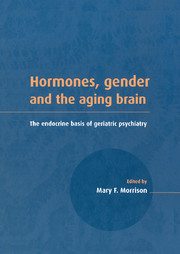Book contents
- Frontmatter
- Contents
- List of contributors
- Preface
- Acknowledgments
- Part I Overview
- Part II Hormones and mental health in the elderly
- 3 The hypothalamic–pituitary–adrenal axis in aging: preclinical and clinical studies
- 4 The hypothalamic–pituitary–thyroid axis
- 5 Estrogen and depression in aging women
- 6 The role of testosterone in male depression
- 7 Dehydroepiandrosterone in aging and mental health
- 8 Sex hormones, cognition, and dementia in the elderly
- 9 Effects of estrogen on basal forebrain cholinergic neurons and cognition: implications for brain aging and dementia in women
- 10 Gender and schizophrenia
- 11 Sex steroids and anxiety disorders
- 12 Gender and hormonal factors in pain and pain inhibition
- Part III Effects of hormones and behavior on immune function
- Part IV Hormones and gender differences in psychotropic drug metabolism
- Index
4 - The hypothalamic–pituitary–thyroid axis
from Part II - Hormones and mental health in the elderly
Published online by Cambridge University Press: 18 September 2009
- Frontmatter
- Contents
- List of contributors
- Preface
- Acknowledgments
- Part I Overview
- Part II Hormones and mental health in the elderly
- 3 The hypothalamic–pituitary–adrenal axis in aging: preclinical and clinical studies
- 4 The hypothalamic–pituitary–thyroid axis
- 5 Estrogen and depression in aging women
- 6 The role of testosterone in male depression
- 7 Dehydroepiandrosterone in aging and mental health
- 8 Sex hormones, cognition, and dementia in the elderly
- 9 Effects of estrogen on basal forebrain cholinergic neurons and cognition: implications for brain aging and dementia in women
- 10 Gender and schizophrenia
- 11 Sex steroids and anxiety disorders
- 12 Gender and hormonal factors in pain and pain inhibition
- Part III Effects of hormones and behavior on immune function
- Part IV Hormones and gender differences in psychotropic drug metabolism
- Index
Summary
Introduction
Aging appears to affect the hypothalamic–pituitary–thyroid (HPT) axis. Between the sixth and eighth decades, serum levels of free tri-iodothyronine (T3) and thyroid-stimulating hormone (TSH) gradually decline while serum thyroxine (T4) remains the same (Mariotti et al., 1993; Muller, 1994; Erfurth & Hagmer, 1995; Monzani et al., 1996). These findings, coupled with decrements in the response of TSH to thyrotropin releasing hormone (TRH), suggest a decrease in responsiveness of the HPT axis with aging. Thyroid function has been known to affect mood and cognition in younger populations, but the impact of these age-related changes, which are not associated with clinical hypothyroidism or hyperthyroidism, on the central nervous system have not been well characterized.
Disorders of thyroid axis function are likely to affect mental function, especially in the elderly (Esposito et al., 1997). The interaction between brain and thyroid hormones starts in utero and continues throughout life, with psychiatric symptoms present in patients with thyroid dysfunction. Depressed mood and psychomotor retardation occur in hypothyroid patients. Anxiety, fatigue, and irritability are observed in hyperthyroidism (Whybrow & Ferrell, 1974; Kathol & Delahunt, 1986). Depression can be a manifestation of unsuspected hypothyroidism (Gold, 1983).
In hypothyroid patients, withdrawal of thyroid replacement may cause increased sadness and anxiety, in particular in those with a prior history of affective illness or mood lability (Denicoff et al., 1990). Patients with severe hypothyroidism may develop a syndrome of marked psychosis (myxedema madness; Asher, 1949).
- Type
- Chapter
- Information
- Hormones, Gender and the Aging BrainThe Endocrine Basis of Geriatric Psychiatry, pp. 53 - 83Publisher: Cambridge University PressPrint publication year: 2000



